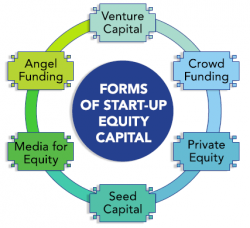Main sources of finance for entrepreneurs2015-05-27 How you finance a business venture can be the difference between success and failure. Tapping into a few different sources of capital may also work to your advantage. That sounds like a lot of paper work, however this tactic may reduce the company's cost of capital and risk saving it from bankruptcy. The following are some example of financial possibilities.
Seed Capital Seed capital is the initial capital used to start a business which often comes from the company founders' personal assets or from friends and family. The amount of money is usually relatively small because the business is still in the idea or conceptual stage. Such a venture is generally at a pre-revenue stage and seed capital is needed for research and development, to cover initial operating expenses until a product or service can start generating revenue, and to attract the attention of venture capitalists. Crowd Funding Crowd funding is becoming an increasingly popular alternative for individuals and small to medium enterprises (SMEs) to raise capital. Individuals or groups are able to raise funding, typically via the internet, for a business idea or project and through using the power of social media via Facebook, Twitter, Instagram etc. The crowd supports initiatives by pledging money, time or both. Project creators are required to reward backers for their financial contributions. These rewards include retail items, recognition and experience or access. South African examples are Jumpstart Africa, Thundafund and Startme which provide a platform for projects ranging from anything from creative to agricultural ventures. Examples of projects: • A musician raising funds to record and distribute their debut album. • A software developer looking to raise funds for their latest mobile app. Websites http://www.startme.co.za http://www.fundfind.co.za https://www.thundafund.com http://www.citysoiree.co.za http://www.kickstarter.com Angel Funding The term angel comes from the early 1890s when prosperous American businessmen invested their money in Broadway productions. This gave them the opportunity to associate with the theatre personalities they admired. An angel investor refers to a high net worth individual - family or friend - who provides capital to start-ups. Angels generally only invest in companies that they believe have an earning potential. Local examples include Shanduka Black Umbrella which is an angel investor group focusing on developing 100% black-owned businesses and AngelHub Ventures. http://www.angelhub.co.za Private Equity Private equity is money invested in companies that are not publicly traded on a stock exchange or invested as part of buyouts of publicly traded companies in order to make them private companies. Media for Equity Media for equity is an exchange of advertising space for shares in a start-up business that often occurs when media companies have unsold advertising space. Advertising can be expensive therefore a start-up company can afford to market their company without parting with valuable cash resources. Soft Loans Soft loans are generally low interest loans that offer preferential interest rates (often sub-prime). These funds are usually backed by government or international social enterprise funds. There are usually conditions attached or obligations to be met. Loans have lenient lending terms. Examples: World Bank, EIB, AFDB, DBSA, IDC. Venture Capital Venture capital is a type of private equity capital typically provided for early stage, high-potential, and growth companies in the interest of generating a return through an eventual realisation event such as an IPO or trade sale of the company. Venture capital investments are generally made in cash in exchange for shares in the invested company. stephanie@superfecta.info www.superfecta.co.za |
Main sources of finance for entrepreneurs
Copyright © 2024 KwaZulu-Natal Top Business
